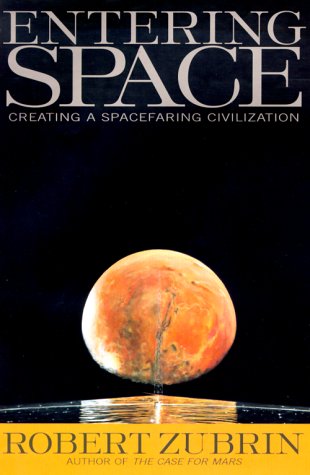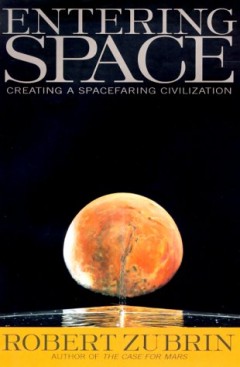
The answer: freedom and opportunity.
Dr. Robert Zubrin has long been a strong proponent of Mars colonization and he has put forth a strategy for doing so with existing technology on the (relative) cheap. Hint: We don’t need to build big spaceships in orbit or colonize the moon first. If you’re interested in this subject, I recommend you check out his books Entering Space, The Case for Mars, and How to Live on Mars. These books are understandable to the layman but also include enough nitty-gritty details and formulas to satisfy the more mathematically inclined enthusiast, and they make excellent resources for science fiction authors.
In the brief video below, Zubrin is answering a question about his book, How to Live on Mars, at the 28th Annual International Space Development Conference, held March 28-31, 2009. Watch it and then continue on after the break for my thoughts on what he had to say.
When I first heard him say that space is all about a free future for humanity, I got excited. But then as he elaborated, I became increasingly dismayed. The problem is that Zubrin seems to equate scarcity with conflict in a zero-sum game in which everyone is competing for a dwindling pie of resources and their products; and he sees getting access to the virtually unlimited resources of the entire universe as the only way to guarantee freedom and brotherhood for all mankind. Shall we have a Soylent Green future? Or a Star Trek future? The answer depends on whether we colonize space, starting with Mars.
I love Entering Space and The Case for Mars, and expect I’ll love How to Live on Mars as well, so this disappointed me terribly. I’m not sure which would be worse: that Zubrin actually believes this false alternative he presents, or that he doesn’t believe it and wants to colonize Mars so badly that he’s willing to concoct a compelling, yet entirely false, story to dupe us into supporting his vision. I suppose honest and economically ignorant is better than slimy huckster, so I prefer to assume the former.
One of the flaws in Zubrin’s story is that it assumes zero technological progress. It’s true that we have a finite amount of resources on planet Earth and that at some sufficiently distant point in the future, eons hence, if the sun doesn’t go nova first, we will use them all up. But people don’t operate on such grand time scales; we are too high time preference for that.
On the time scale in which human action is conducted, economic pressures and an increasing division and specialization of labor tend to lead to the postponement of the final exploitation of a given resource. New sources are discovered. New methods of extraction are invented. More efficient methods of consumption are developed. And, when push comes to shove and supplies dwindle short of demand, leading to higher prices if governments do not interfere with the market, alternatives are discovered and commoditized. This process will continue through our lifetimes and at least the lifetimes of our children and our children’s children.
So we don’t have to see each other as enemies simply because we don’t have the vast resources of the universe at our disposal.

But the main flaw in Zubrin’s story is that colonizing space won’t solve the problem of scarcity. Plentiful, even unimaginably plentiful, is not the same thing as non-scarce. The unimaginably plentiful resources of the universe will not suddenly be made available to us all at once as we enter space with the intent on exploiting and colonizing it. They are to be found in clumps spread far and wide through the universe. Our ability to exploit them will be limited by capital and technology and time. As more resources become available, they will be exploited to meet insatiable, pent-up demand. There will always be the potential for conflict over scarce things.
We already have the solution to the problem of scarcity, and we’ll need to implement it just as consistently in the broader universe as we already need to, but don’t do, right here on Earth. That solution is clearly defined, consistently respected, and strongly enforced private property rights.
The fundamental and conjoined rights to liberty and property are the metanormative principles that make all forms of human flourishing morally compossible. They are a basic requirement and are constitutive of respecting others as rational beings, as moral agents, as persons. Property rights function to avoid, or at least minimize, conflict over scarce resources by the assignment of moral and legal claims of exclusive ownership, serving as the basis for mutually binding and enforceable rules governing the peaceful acquisition, use, exchange, and abandonment of property — provided states don’t systematically violate them and interfere with market activity.
Ironically, we already have one non-scarce resource at our disposal: ideas. And yet Zubrin appears to approve of patents, which are nothing but statist grants of monopoly privilege that have the effect of creating artificial scarcity where before a truly infinite and immediately available supply existed. Patents stifle innovation, hinder progress, and divert valuable resources and competitive energy away from real productive uses to wasteful conflict in the realms of politics and litigation.
The real reasons why space is so important are not so dramatically stark and falsely dichotomous as a Hollywood plot device, and yet they are still wonderful and inspiring. There is a superabundance of resources available in the universe for our exploitation that will make possible wonders that we cannot yet conceive. The frontiers of space present infinite opportunities to those with an entrepreneurial spirit — opportunities for starting over, for making a new life for oneself, for bold social experiments and business ventures. Out on the frontiers of space, there is the promise of escape from the long tyrannical arm of the state — at least for a while. Isn’t that enough?















